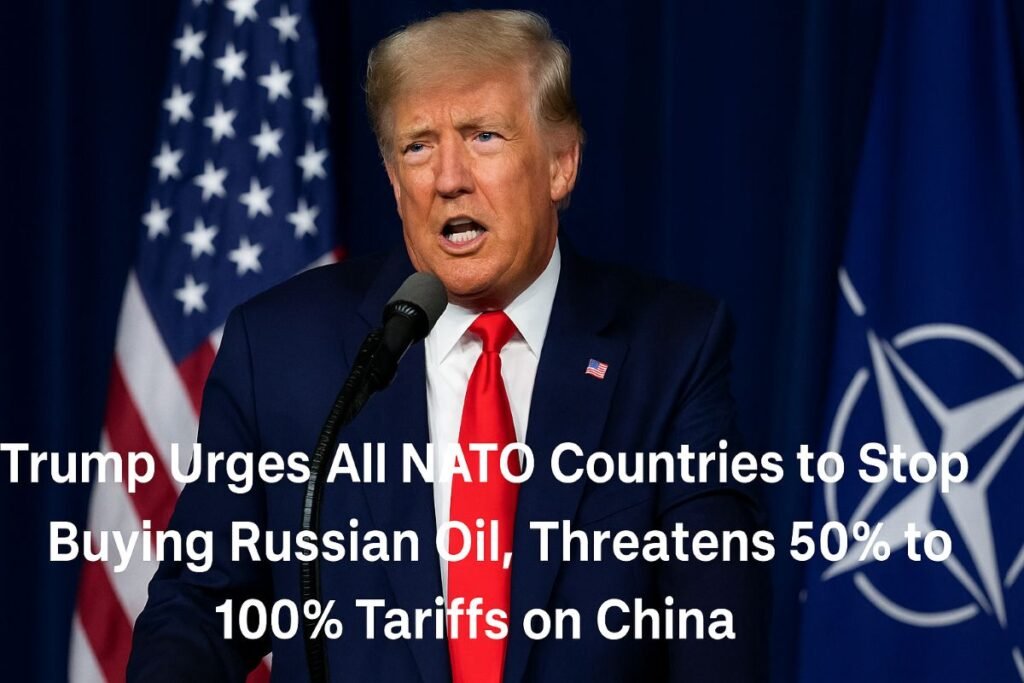President Trump urges NATO allies to halt Russian oil imports and threatens sweeping tariffs on China, signaling a bold shift in U.S. foreign policy.
In a fiery address delivered from his campaign headquarters in Florida, U.S. President Donald Trump called on all NATO member states to immediately halt purchases of Russian oil, citing national security concerns and the need to economically isolate Moscow. Simultaneously, Trump issued a stark warning to China, threatening to impose tariffs ranging from 50% to 100% on Chinese imports if Beijing fails to address what he described as “unfair trade practices and currency manipulation.”
The dual-pronged announcement marks a significant escalation in Trump’s foreign policy rhetoric, as he seeks to reassert American dominance on the global stage and pressure allies into aligning with Washington’s strategic goals.
“Every barrel of Russian oil bought by our allies is a dollar that funds aggression in Ukraine and destabilizes Europe,” Trump said. “It’s time NATO stops funding our enemies and starts standing up for freedom.”
Trump’s remarks come amid growing tensions between Russia and Western nations, with the war in Ukraine entering its fourth year. While the European Union has reduced its reliance on Russian energy, several NATO countries continue to import oil and gas due to domestic energy demands and infrastructure limitations.
Trump’s call for a complete embargo on Russian oil imports by NATO members is expected to spark debate within the alliance, particularly among countries like Hungary and Turkey, which maintain complex energy relationships with Moscow.
Turning his attention to China, Trump accused Beijing of “economic warfare” and warned that unless China takes immediate steps to reduce its trade surplus with the United States, he will authorize sweeping tariffs on Chinese goods.
“We’re not going to let China rob us blind anymore,” Trump declared. “If they don’t play fair, we’ll hit them with tariffs they’ve never seen before—50%, maybe even 100%.”
The proposed tariffs would target a wide range of Chinese exports, including electronics, machinery, textiles, and consumer goods. Economists warn that such measures could trigger a new wave of trade tensions, potentially impacting global supply chains and consumer prices.
Trump’s speech signals a broader strategic realignment in U.S. foreign policy, emphasizing economic leverage and alliance discipline. Analysts suggest that Trump is attempting to reshape NATO into a more economically cohesive bloc that aligns with U.S. interests—not just militarily, but also in terms of trade and energy policy.
“Trump is essentially saying: if you want American protection, you need to follow American rules,” said Dr. Elena Markovic, a senior fellow at the Atlantic Council. “It’s a transactional approach to diplomacy that prioritizes economic pressure over consensus-building.”
The international response to Trump’s remarks has been swift and varied.
- Germany, one of NATO’s largest economies, expressed concern over the feasibility of a complete Russian oil embargo. “We support reducing dependence on Russian energy, but it must be done responsibly,” said German Chancellor Annalena Baerbock.
- China’s Ministry of Commerce issued a statement condemning Trump’s tariff threats as “reckless and harmful to global trade stability.”
- Russia, meanwhile, dismissed Trump’s comments as “political theater,” with Kremlin spokesperson Dmitry Peskov stating, “The U.S. president is trying to dictate global energy policy without understanding its complexities.”
Trump’s speech is also seen as a strategic move to energize his base ahead of the 2026 midterm elections. By taking a hardline stance on China and Russia, Trump is positioning himself as a defender of American jobs and sovereignty.
“Trump knows that economic nationalism plays well with his voters,” said political strategist Maria Lopez. “He’s tapping into frustration over trade imbalances and foreign entanglements.”
If implemented, Trump’s proposed tariffs could have far-reaching consequences:
- U.S. Consumers may face higher prices on imported goods.
- Manufacturers reliant on Chinese components could see increased costs.
- Global Markets may experience volatility as investors react to trade uncertainty.
However, Trump argues that the long-term benefits—revitalizing domestic manufacturing and reducing dependence on adversarial nations—outweigh the short-term disruptions.
Trade experts caution that unilateral tariffs could violate World Trade Organization rules and provoke retaliatory measures.
“Tariffs of this magnitude are unprecedented,” said Dr. Rajiv Menon, professor of international economics at Columbia University. “They could lead to a tit-for-tat escalation that harms both economies.”
Nonetheless, Trump remains undeterred. “We’re not afraid of a trade war,” he said. “We’re already in one—and we’re going to win it.”
The White House is expected to release a formal policy proposal in the coming weeks, outlining the scope and timeline of the tariff plan. Meanwhile, diplomatic channels with NATO and China remain open, though strained.
As Trump doubles down on his America-first agenda, the world watches closely—uncertain whether his threats will materialize into policy or remain campaign rhetoric.

